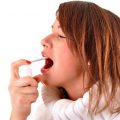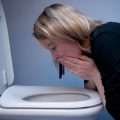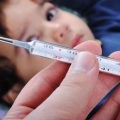Food poisoning - a severe form of the disease, which occurs by eating foods, poisoned microbes and toxins or bacteria containing noxious components of animal and vegetable origin.
Food poisoning is more common in children, than adults, t. to. fragile body of the child is not strong enough to resist most poisons and infections, intoxicating. Because the task of parents - to prevent disease, and when it occurs - to recognize the signs and symptoms and timely to organize a proper treatment at home.
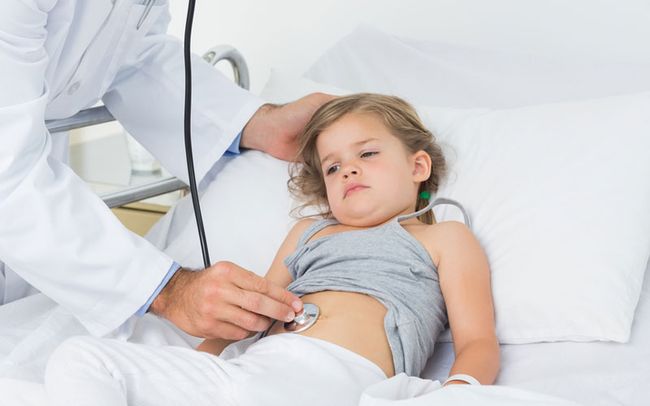
Why is poisoning
Food poisoning is caused by the activity of pathogenic bacteria and germs, who live in food and leave them toxins and poisons. Activators may be poisoning toxins staphylococci, salmonella, stryeptokokkov, E. coli and many other microorganisms.
There are three main types of food poisoning:
- After contact with the toxic chemical substances in the gastrointestinal tract;
- When eating mushrooms, poisoned meat or fish, poisonous plants;
- When ingested food poisoned microbes.
All these types of poisoning occur by eating so-called "substandard products", t. it is. those, who for some reason have become dangerous for human consumption:
- Due to the expiry of the shelf life (the process of decomposition and putrefaction leads to the accumulation of the products hazardous to the body of toxins).
- Due to the insemination of fresh produce harmful bacteria (eg, E. coli is most often found on unwashed fruits or vegetables).
- Due to the destruction of fresh food toxins (in violation of preparation technology).
The second group includes the dangerous bacteria poisoning, which causes the characteristic signs of intoxication due to infection in the digestive tract.
note! It is not necessary to give the child to prepare a salad or dish, bought in the supermarket or public catering. Often in these foods show a high content of E. coli, staphylococcus and other harmful bacteria.
There is a list of the most "disadvantaged" products, the use of which often entails food poisoning. Can poison the following products:
- Fish and seafood;
- Milk and dairy products;
- Confectionery (with the presence of the cream);
- eggs (raw or especially with the presence of damage);
- Meat and meat products (pates, jelly, burgers);
- Greens and root vegetables for salads.
Of great importance is respect for cooking sanitary standards and compliance with the conditions of its storage.
If the child is accustomed from childhood to elementary hygiene standards, sooner or later, food poisoning can not be avoided.
Signs and symptoms of food poisoning
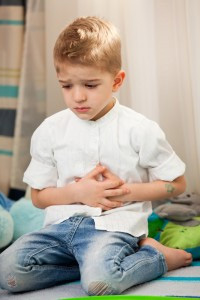 Food poisoning in children are divided into two periods: asymptomatic period of the disease and clinical manifestations bright.
Food poisoning in children are divided into two periods: asymptomatic period of the disease and clinical manifestations bright.
Latent (asymptomatic period) It lasts from the moment of infection and the body prior to the onset of poisoning symptoms. The duration of the period can vary from 30 minutes to 24 hours - it depends on the amount of food eaten, the child's age, type pathogen, type of toxin or poison, and individual characteristics of the child's organism. During this period, symptoms of poisoning may not appear or appear slightly: general weakness, malaise, sweating, a sense of discomfort. Once the toxins are beginning to be absorbed into the blood, the phase of a bright clinical picture of poisoning
Detailed clinical picture - the period from the moment of absorption of poisons into the blood stream until they are completely eliminated from the body. The duration of this phase depends not only on the individual characteristics of the child's body, but also on the timeliness of the decision to get rid of toxic action.
The main symptoms:
- nausea;
- vomiting;
- stomach ache;
- diarrhea.
Food poisoning is manifested symptoms of the stomach and intestines and signs of general intoxication. poison, the child becomes drowsy, sluggish, He refuses to eat. With increasing weakness and discomfort, the first signs of food poisoning - nausea.
Further, there are pains in the stomach (varying severity), the temperature rises - in children under 5 years it may exceed 39,5 degrees.
To remove toxins, the body begins to take protective measures - there is vomiting and diarrhea.
Important! Vomiting and diarrhea are particularly dangerous for the baby, t. to. they can cause dehydration, and with it the dangerous complications of intoxication.
Usually, food poisoning symptoms begin to diminish after 1-2 day, while drowsiness and weakness remains. Can some time be saved headaches, stomach ache, frustration of a chair and a lack of appetite.
In children, the symptoms of poisoning are not always the same - depending on several factors (age, immunity, et al.) one child may open severe diarrhea, another - vomiting, and a third body react general weakness and appearance temperature. In any case, do not delay treatment - must immediately provide first aid kid and not to delay calling a doctor, if the symptoms are persistent and begin to grow.
First aid for poisoning
Upon detection of the first signs of food poisoning is recommended to call the doctor, but some first aid you can provide yourself at home.
What to do and what to give the child in the first place:
- wash out the stomach. Rinsing is necessary to begin to do at first suspected food poisoning, in the moment, when the child has nausea. To expedite the process of removing toxins, your child is recommended to drink 2-3 cup of warm boiled water, so as much as possible to stretch the stomach and cause an attack of vomiting. The good effect is obtained by using a weak solution of potassium permanganate for call vomiting (It recommended for children from 6 years of age).
- Give activated carbon. It is the safest sorbent, used for food poisoning in children. It neutralizes the toxins in the gastrointestinal tract and facilitates the overall condition of the child. Activated charcoal is given to children in the form of Atomized: at 1 year - 1 tablet per day, at 1-3 of the year - 2 tablets a day, hereinafter - the dosage is calculated, based 1 coal g 1 kg weight.
- give starve. Loss of appetite and refusal of food - one of the symptoms of food poisoning. Do not give your child food force, it is desirable to skip a few meals or on the first day of poisoning at all starve. As soon as the child will be easier, he asks him to feed. Hungry pause can not make babies, especially babies with low weight.
- Provide plenty of drink. The main principle of treatment of food poisoning - fill fluid loss in severe vomiting or diarrhea. Often used for this solution rehydron, which is given to a child at a dose of 1-2 Article. spoon every 10-15 minutes, or after each bout of vomiting (or liquid stool). If rehydron not at hand, can be given the usual boiled water. drinking rules: frequent reception, fractional drink (not gulp, and a little bit - in several stages), drink should be warm - room temperature.
note! All of these measures it is advisable not apply to children under 1 of the year, especially if the child's behavior causes concern (overly excited or drowsiness).
First emergency care child food poisoning should be able to provide every parent. In this case, use any drugs (antiemetic and antidiarrheal agents, antibiotics, painkillers) without consulting a doctor is not recommended.
When to see a doctor
experienced pediatricians (in particular, Dr. Komarovsky) advised to seek medical advice for any, even seemingly mild poisoning in children, t. to. even the most innocuous situation may well turn into unpredictable.
but, There are a number of conditions, in which the call of the doctor is a must:
- Age of three. Children, which turned 1-2 of the year, We should be treated for food poisoning only under medical supervision. For infants of food poisoning may be dangerous to life, so the children of this age are treated only in a hospital.
- Symptoms increase and the condition does not improve within days. Perhaps intoxication caused by other factors, determine that a force of only doctor.
- There are signs of dehydration. The main symptom of dehydration - lack of urination for four hours or more. The child develops an extraordinary weakness and lethargy, tongue and skin to become dry.
- Heat. The temperature increase means, that the body's defenses included and actively fight germs. But if the high temperature is kept for a long time, it may, together with other poisoning symptoms lead to dehydration.
- rash, Blood in the stool (or vomit), yellowing of the skin and eyes. These are signs of other serious diseases, which should be treated only by a doctor.
The reason for calling the doctor is also the fact, When food poisoning are exposed to all the family members, and no one can ensure proper care and treatment of child.
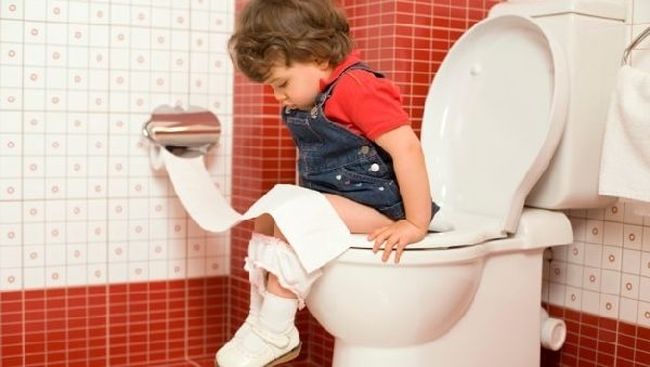
What to do in case of poisoning
First aid, was a child in case of poisoning, able to alleviate the condition toddler, but not cure it completely. Further treatment prescribed by the physician depending on the severity and type of symptoms of poisoning.
drug therapy
For the treatment of food poisoning, three groups of drugs:
- sorbents: Activated carbon, SMEK, Entyerosgyeli, Polifepan.
- probiotic: bifiform Baby, Laktobakterin.
- antibiotics: cefixime, Nifuroksazid.
Antibiotics for the treatment of food poisoning are appointed extremely rare - just 10% all diseases. Use antibiotics on their own without consulting a doctor - is strictly prohibited.
folk ways
Traditional methods help to relieve the symptoms of poisoning and reduce the rehabilitation period after poisoning.
- ginger broth. shredded ginger (1 ch.lozhka) pour boiling water (one glass), then decoction gives the child every hour 1 no. spoon. Relieves nausea, It eliminates toxins.
- rice-water. Rice boiled in a ratio to water 1:5 for one minute. Giving can be broth every hour during the day. Decoction helps to prevent vomiting and diarrhea.
- Decoction of chamomile and calendula. Brewed teaspoon of dry material in one liter of boiling water. After that, the broth is divided into several parts and is drunk throughout the day. It helps flush toxins, remove the symptoms of intoxication.
- Broth from oat flakes. Cereals (two tablespoons) filled with water and cook over low heat 5-7 minutes. Decoction is filtered and drunk during the day for 4-5 receptions.
The use of any of the national funds should be discussed with your doctor.
Diet
If poisoning is affected gastric mucosa, intestinal wall injured prolonged vomiting and diarrhea. Diet after poisoning aimed at, to relieve the irritation and restore the functioning of the gastrointestinal tract.
To this end, the first days (1-2 day) should hold the baby to "starvation" diet, while providing abundant and frequent drinking. This method does not apply to children under one year, tk. year-old child should receive the food after only 3-4 hours after the symptoms subsided. These babies are fed breast milk or formula milk without lactose.
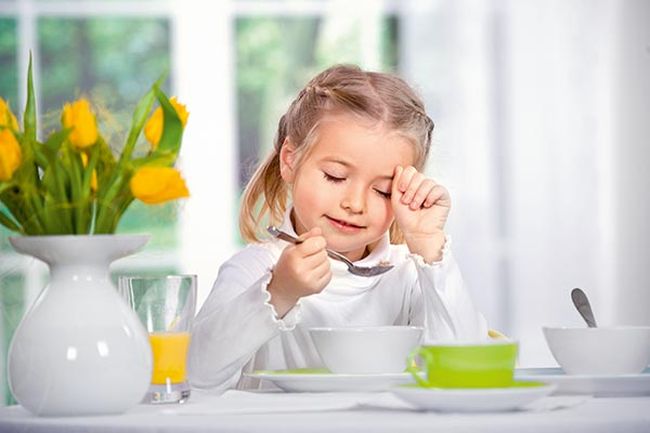
children, which turned 2 of the year, in the first days after poisoning can eat the following dishes:
- rice-water;
- infant formula;
- liquid (the water) mashed potatoes, rice or oatmeal;
- Crackers of white bread;
- Vegetable soup easy;
- Rather weak, sweet tea.
Beginning with 5-7 days after poisoning, allowed to gradually expand a diet diet, including food gradually lean meat or fish dishes.
How to avoid poisoning
Reduce the risk of food poisoning in children can help to minimize the compliance of simple recommendations:
- hygiene. For simple rules (washing hands before eating, after using the toilet, after a walk) should teach a child with childhood.
- Excluded from the child's diet products, which can cause poisoning: mushrooms, raw and unwashed vegetables and fruits, unboiled milk, poorly cooked eggs.
- Observe the rules of cleanliness and food storage facilities, where you store and prepare food.
- Heat treatment. The fourth point is especially important when cooking for the baby - bad or incorrectly cooked foods are often the cause of poisoning in children.
Any manifestation of digestive disorders in children - a reason to sound the alarm. After all, it can lead to irreversible consequences and complications. Therefore, parents should be able to identify signs of poisoning the child and to know, how to treat the disease at home.






